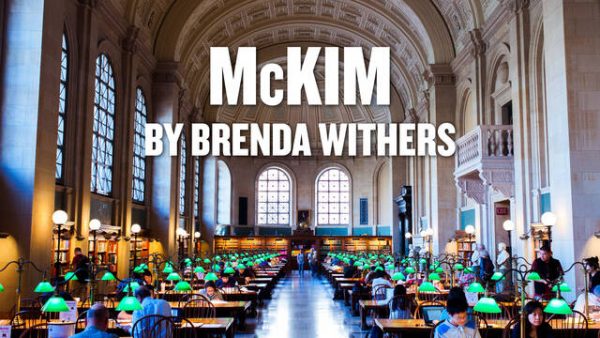Theater Review: Finding Hope in Isolation — “Dream Boston,” Episodes 1-5 @ The Huntington Theatre
By Ezra Haber Glenn
In this innovative series, the Huntington Theatre Company has charged 11 local playwrights to imagine a future vision of Boston, post-pandemic, when “we can once again meet and connect in our city.”

The playwrights contributing to Huntington Theatre Company’s DREAM BOSTON Podcast series. In alphabetical order John Oluwole ADEkoje, Miranda Austen ADEkoje, J. Sebastian Alberti, Roseanna Yamagiwa Alfaro, Elle Borders, Patrick Gabridge, Kirsten Greenidge, John Kuntz, Melinda Lopez, Kate Snodgrass, and Brenda Withers.
Dream Boston: All 11 episodes in the series can be found for free on the website of the Huntington Theatre Company, or downloaded through Spotify, Soundcloud, or most podcast apps.
Coming in for a landing at the end of a frantic monologue set in the Boston Public Library in the year 2023, Lillian Nuñez (Krystal Hernandez) considers the magical possibilities that would be conjured by reading a book about your own life: “And if I turn the page…it might tell me the future! And who wants to know that?” she asks.
“Not me,” replies Edward, the wry librarian who serves as straight-man at the receiving end of Lillian’s pent-up, post-shutdown energy. “I like surprises.”
The play is McKim, by Brenda Withers, part three in a series of short podcast audio-plays in the Huntington Theatre Company’s Dream Boston series. And yet, as in so much of the witty, tightly scripted dialogue in these elegant little vignettes, one senses an ironic wink and a smile at the conceit behind the series. We — the listeners — very much do want to know the future: how this insane slow-motion dumpster-fire of a year will end — and, more specifically, that this all will end.
Through this innovative series, the Huntington has charged Withers and other local playwrights to imagine a future vision of Boston, post-pandemic, when “we can once again meet and connect in our city.” The first five episodes lean very heavily into the “hope and optimism” aspect of these dreams: all explore futures where we recover, despite some setbacks. The library reopens, the fireworks return to the Esplanade, the moment of reckoning for racial justice is embraced. The stories can be sappy at times but, or the time being at least, the sweetness helpfully coats reality’s bitter pill.
(Note: so as not to give short-shrift to the individual plays and the changing nature of the series over time, this review only covers the first five episodes; we will return with additional installments covering subsequent pieces. But here’s a teaser: the series departs from its initial sunny optimism and explores more complicated, at times darker, themes.)
The goal, it would seem, is twofold: on the one hand, by providing a venue to connect with remote audiences today, the series is keeping theater alive, for the present; at the same time, for those of us tuning in, closing our eyes, and connecting to these stories, we are encouraged to keep hope alive, for the future.
Indeed, bridging our shared past, present, and future is a thread that runs through many of the pieces. And this theme becomes all the more amusing once we realize that the past of these characters is our present; our future-fears might be their recent losses; and our fuzzy and idealized dreams are their — often messy — realities.
Beyond charting these interconnected landscapes of time, history, memory, and the future, the plays all embrace very real landscapes: freed from the confines of the physical theater and the need for expensive sets (and perhaps eager to remember the joy of visiting so many parts of our city, while we shelter in place), each piece is explicitly located in a unique part of Boston, somewhere special to the playwright and the characters. Thus, in each drama, there is a hidden character: our city.
In addition to the BPL, over the first five episodes we find ourselves on top of MIT’s Great Dome for the Fourth of July, at the battlefields of Lexington and Concord for Patriot’s Day, and racing to Franklin Park for the (newly designated) Juneteenth federal holiday. The obsession with large celebratory events – an easy way to make a moment significant and theatrical – is understandable, given the isolation of the shutdown, although equally meaningful are the opportunities to reflect on what a return to “normal” might be like.
This geographic element is so central to the project that the HTC has created an interactive map for the series. Future episodes round out the tour: Malcolm X Boulevard, Harvard Yard, a gentrified Nubian Square, and other familiar — though often changed — locations. At their best, the tools employed by the sound engineers provide a light enough touch to transport us to these locations. At times, though, this “place-setting” can be a bit clunky – canned fife-and-drums, distracting sound effects – and there are a few regrettable moments of “telling, not showing,” when actors awkwardly describe the settings.

Of course, the audio-only format gives actors opportunities to portray their characters through nothing but sound. It is a fun and challenging exercise that leads to a few unfortunately overripe Boston accents. Still, there is some very delicate work that gets at race, class, and gender dynamics. The tools are subtle: a carefully placed bit of slang; a pause, sigh, or hesitation; the connotations of a particular name. (Upon reflection, it’s also impressive that the actors have managed to bring these figures and their interactions to life in isolation, without the benefit of the usual cycle of multiple performances and audience feedback of an in-person theater.)
It’s difficult to write much about these short episodes without giving away too much but, in general, Dream Boston delivers many of the rewards of in-person theater at a safe and healthy distance. As with most collections of shorts or one-acts, the overall quality is a little spotty – episode two (By the Rude Bridge) comes off a bit like a history lesson you might hear through an earpiece at a museum; episode five (Joy) obviously tugs (yanks?) on the heart strings during a plague time. But the success rate is nonetheless pretty high. At some point in nearly every episode – in the span of just a 10-minute-long script, a couple of characters meeting in the space between two earbuds – the plays manage to orchestrate the kind of poignant twists that drive drama: those “aha!” moments when we see something new, or something old, in a new light.
Towards the end of McKim, Ed the librarian puts humor aside in order to reassure Lillian, who is beginning to panic that she may not find the book she has been waiting for all these long months. He oh-so-calmly explains that, while the book she wants may be checked out at the moment, it is sure to return: “My favorite thing about this place is that everything comes back.”
With their initial foray into the world of podcast theater, the cast and crew of the HTC gently, confidently, and caringly remind us that our theater, our community, and the city we love are not gone forever. Like a library book, Boston may return worse for wear, dog-eared and wine-stained, but it will be back.
Ezra Haber Glenn is a Lecturer in MIT’s Department of Urban Studies & Planning, where he teaches a course on “The City in Film” and coordinates an ongoing Urban Planning Film Series. His reviews and essays have appeared in the Atlantic‘s CityLab, the New York Observer, Experience Magazine, and Next City. He is the regular film reviewer for Planning magazine. He lives in Somerville, where he serves on the Board of Directors for the Somerville Community Corporation, a local nonprofit committed to affordable housing and community empowerment.

[…] in the city – a vision of a future Boston that is somewhere between dream and reality. Arts Fuse review of Episodes 1 through […]
[…] the city — a vision of a future Boston that is somewhere between dream and reality.” Arts Fuse review of Episodes 1 through […]